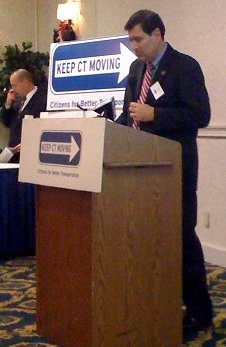
On Friday, Keep CT Moving, a coalition of labor and business groups for transportation investment, held a gubernatorial forum for the Democratic candidates for Governor. The six candidates, former Connecticut House Speaker Jim Amann, Secretary of State Susan Bysiewicz, State Senator Gary LeBeau, Greenwich businessman Ned Lamont, Stamford Mayor Dan Malloy and Ridgefield First Selectman Rudy Marconi all spoke broadly to the need for Connecticut to invest in its road, bridges and rail as a way to bolster Connecticut’s transportation system and generate jobs.
But with the exception of Senator LeBeau, and to a lesser extent Malloy, none of the candidates provided any specifics as to what Connecticut needs in terms of funding and what sources of revenue could fill the looming deficit of the Special Transportation Fund. This fund pays for the construction, maintenance, and operation of the state’s transportation network but will run out of money by 2011.
Senator LeBeau raised the possibility of increasing gas taxes and fees or implementing electronic tolling. Malloy stated he could support tolls, but only after the State ensured that current funding sources like the petroleum gross receipts tax went to transportation and not the general fund. The toll revenue, too should be dedicated to transportation projects, including new roads and highways, he said.
None of the candidates mentioned linking land use and transportation or the need to promote transit oriented and smart growth development to sustainably solve Connecticut’s congestion problems. Neither did they mention pedestrian or cycling infrastructure. And while all the candidates touted the need for investment in rail, only Malloy mentioned, albeit briefly, the need for a robust bus network.
The campaign to succeed Governor Rell is only beginning, and the Democratic candidates need a bit more substance and fewer platitudes in their transportation platforms. Most need to take a harder look at the issues facing Connecticut’s transportation system, including some of the worst bridges and roads in the nation, sprawl-induced congestion, inadequate transportation funding, and a failure to move forward with projects of regional significance like the Hartford-New Britain busway and the New Haven-Hartford-Springfield commuter rail line.
Image:TSTC.

I see how NHHS rail is a project of regional significance, but the busway? Come on–the project will only run 9.5 miles!
“Regional” is a relative term. The Busway can be an important regional project for the greater Hartford region, addressing mobilty in the most congested corridor in that region. But if you define “regional” on a higher plane to include more inter-city or inter-state travel, I would agree the Busway does not address issues at the same level as the rail project, even if you include the potential for one-seat bus rides from as far afield as Meriden, Waterbury and other far-removed Hartford commutersheds communities.
While I wasn’t in attendance, I was shocked by the New Haven Register’s coverage of Susan Bysiewicz’s dismal response. She appeared to dodge the topic completely. Susan—sit down with Senator Dodd for some schoolin’!
Transportation is vitally important to Connecticut’s economy and the funding requirements that are looming will be a bitter pill for everyone to swallow. We absolutely need a leader who is courageous enough to address this topic effectively.
Kudos to Senator LeBeau for the reality check. I don’t know much about him, but will certainly look into him now.
[…] month, the presumed Democratic candidates for Governor spoke broadly about transportation policy in […]